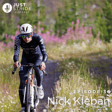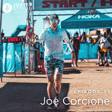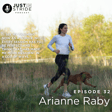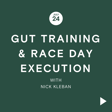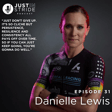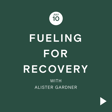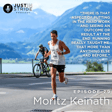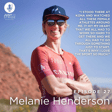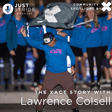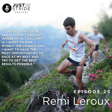Introduction to Justin's Drive Podcast
00:00:06
Speaker
Hello and welcome to the Justin's Drive podcast. I'm your host, Justin Puleze. If you love endurance sports, you've definitely come to the right place. On this show, we'll talk to athletes, coaches, and professionals who can help us reach our true potential.
Justin's Journey in Endurance Sports
00:00:21
Speaker
Being a student of distance running for over 10 years and interviewing people in the sport for the last five, I've learned a ton, but there's always more to discover. Everyone has a story, and I know you'll resonate with each of our guests as we embark on this new journey together.
00:00:36
Speaker
Join us at home, on the road, or while you run. Together, we'll have some fun. So follow along on Instagram at justinstridepod and your favorite podcast platform and prepare to be inspired. Come along for the ride with Justin Stride.
Sponsorship and Community Engagement
00:00:53
Speaker
This episode is presented by our friends at Exact Nutrition, a tasty and healthy way for you to fuel your body before, during, and after a solid training session. I can't leave the house without a few fruit bars in my pocket and they never make it back home. Exact is offering you 50% off your order when you use the code justinstride. So head to exactnutrition.com and fuel your goals today.
00:01:17
Speaker
I love thinking about the idea that just because your life has been a certain way until this point doesn't mean you can't change your own trajectory. Who you were 10, five, or even last year is not the same person you are today. We live, we learn, and we grow. Take the time to acknowledge the challenges and accomplishments in your life and celebrate how far you've gotten.
Featuring Jasmine Lawther: From Childhood to Professional Running
00:01:38
Speaker
On this episode of Justin Stride, I had a pleasant chat with elite ultra trail runner and nutrition coach Jasmine Lawther.
00:01:45
Speaker
She had an active and competitive childhood, but fell out of sports and into other interests that put her future in danger. Fortunately for her, she realized her own potential before it was too late. Today, her focus is much different, becoming a pro ultra trail runner and going all in. Her breakout year was in 2022.
00:02:06
Speaker
winning the 100K as an underdog at Canyons, earning a golden ticket to Western States, and finishing fourth in the CCC at UTMB in Chamonix. Unfortunately, after that, injuries got in her way of realizing some of those dreams, but she's shown resilience, battled back, and is ready to compete this upcoming season. Hello, Jasmine. Welcome to Justin Stride. Hey, Justin. So happy to be here. So great to meet you.
00:02:36
Speaker
Yeah, good to meet you too. I was just telling you before, but I figured I'd share. Your name came up on a random run here in Zurich and I was joining a new group on a Sunday, started running next to a guy who's like a ultra trail, trail runner. Um, and your name popped up cause he found out I was Canadian, you're Canadian. And, and so that's kind of how this came about. So I'm, I'm thrilled that you accepted the invite.
00:03:03
Speaker
Yeah, absolutely. And I have so much homework to catch up on because I saw while I listened to Emily Hawgood's podcast with you, great conversation. And yeah, you've been on a role interviewing so many interesting people. So I'm super happy to be here.
00:03:21
Speaker
Wait, so you were in Zurich. I am living here now. You're living in Zurich. Wow. Congrats. Yeah, thanks. Been about a year now. My dream is how do I move to Switzerland or France or Italy for at least a year?
Trail Running Community and Environment in Canmore
00:03:38
Speaker
But you have some pretty awesome places to train where you are though.
00:03:42
Speaker
Yes. Yeah. So I'm based over in Canmore, which in my mind is like a slice of European Alps in Canada. And it's very much a Mecca for trail running. And that's exactly why I moved here. It's just endless to all the trails right outside your door. It's awesome.
00:04:03
Speaker
I actually met somebody here who traveled to Canada and was in those parts in the Canadian Rockies and was fascinated with how big the Rockies were. He thought the mountains here were big, but he was very impressed with what he saw in Canada. He was almost shocked.
00:04:28
Speaker
That's good to hear. Because sometimes going to Europe, it's such massive relief. And coming back to the Rockies, they are a very old mountain, mountain range. And some of them are shrinking. They're actually going down in height. But the actual area that they cover is quite massive for sure. And they're just so majestic. Yeah. Were you always drawn to the mountains, the mountain, the trails in particular?
00:04:58
Speaker
Yeah. Yeah, we'll see if we get into it. But there's been times in my life where I was less active and maybe had some different other interests in life. But then I came back into sports and outdoor, just being outside through rock climbing, actually. And then
00:05:23
Speaker
the year that COVID hit, I kind of blossomed more so towards trail running. And I think with trail running, it just draws you naturally to the mountains. And I kind of started to open my eyes to where in Canada should I be for more trail running and definitely Canmar rose to the top. Would you say it's a good destination for people looking to excel in the sport?
00:05:50
Speaker
Absolutely, yeah so Canmar also is just a hub for lots of Olympians or there was just the World Cup for Nordic skiing here a few weeks ago and there's like a whole neighborhood where only Olympians live.
00:06:06
Speaker
And then not only that, it's just like ice climbing, rock climbing, water sports, paddling. You've got all the trail runners. There's like five different trail running groups that you can meet up with during the evenings. Sometimes it'll be like minus 25 Celsius and there's still 50 people that show up.
00:06:28
Speaker
There's a lot of very active people here, for sure. The folks who live here, it's really cool. Yeah, similar to Squamish on the west coast of Canada as well, which is another hub for lots of trail runners, lots of skiers, things like that. My friend Jeff speaks fondly of the 50-50 in Squamish. Yeah. He's like, you got to come out and do it.
00:06:52
Speaker
I'm not a big ultra guy, like a more marathon road. I love running into trails, but my clumsy feet get me into trouble. But that's a cool race out there, and there's lots of that. And would you say the community is inviting to not only top-end elite runners, but also your everyday runner too?
Coaching Philosophy and Athlete Development
00:07:21
Speaker
Yeah, which surprised me. I think coming from, so I'm originally from a small town called Nelson in British Columbia. And I always looked at Canmore or even Squamish, but especially Canmore as this intimidating presence filled with very elite athletes. But I would come up on the weekends to
00:07:43
Speaker
explore the trails and things like that. And immediately I was struck by how warm and friendly people were. It didn't feel super intimidating. Yes, there is the higher level of just on average athletes here, but I think there's just such a wide range of people just getting into the sport, things like that as well. I've been coaching and then that has
00:08:14
Speaker
blossom within the community here. I coach internationally but there's quite a few athletes that I work with who are just starting out in trail and some people are in their 50s and their 40s or in the early 20s and they're just getting into trail running.
00:08:34
Speaker
Um, definitely there's something for everyone here for sure. And how do you, cause I know, you know, you're at a certain level and then you're coaching athletes that are various levels. So how do you make it relatable for everybody? Yeah. Um, I definitely, um, so in terms of coaching, I meet the athlete where they are.
00:09:00
Speaker
And I go through almost like a rigorous interview, but I just want to get to know people. So it would be a chat almost like this to be able to understand, okay, what's their history? What are their motivators? What gets them going? What gets them out the door? Why are they drawn to whether it's trail running? Lots of people are juggling their other sports too.
00:09:26
Speaker
Um, so it's always putting that in into the perspective of, um, yeah, what do they want to get out of it? Do they want to have a summer where they can go and do some 20 K's, 30 K's in the mountains? Um, most people are starting off with like their first 50 K race and to get them prepared for that. So, um, yeah, it's, it's, um, juggling all of those values.
00:09:53
Speaker
and kind of that big picture of what do they want to get out of it. And yeah, I always am reminded of those days when you start out in a sport, how humbling it can be. And there's so much to learn, which is always so exciting. So I put myself in their shoes and usually that's not too hard because
00:10:18
Speaker
within my story as an athlete, I am routinely put back into that starting up again position, which, um, which has been hard. Um, but, uh, yeah, it does remind you of, uh, it just having patience in that process. Yeah. I was going to say, well, I coach a few athletes too. And it's amazing when you get talking to them, how many things come flooding back to your mind. Yeah.
00:10:48
Speaker
through your own experience, what you've learned, you know, you remember the people that taught you certain things that you and it's all that like you're just paying the paying it forward. And it's amazing the things you won't think of if you don't have that that guidance, you know. Yeah, yeah. Everything that can feel kind of awkward or clunky, that over time just become habit, whether it's like, oh, making sure that you're fueled before your run or
00:11:16
Speaker
warmups before running or, um, um, yeah, just there's a lot that, uh, yeah. And so typically that's, this is something I asked later on in the interview, but because you said, you know, you've, you've stopped and started many times. Like what, what, what would you say is like.
00:11:36
Speaker
Um, good advice for somebody looking to start maybe for the first time, or maybe you fell out of love with, with something that they used to care about and then wants to get back into it. Yeah. Yeah. You're kind of touching on almost two things in my mind or, or, um, I would frame it in two different ways. I think number one is, is just having patience and allowing for a gradual ramp up in your training. Um, yeah, take it from me. I've been injured. Um,
00:12:07
Speaker
a few times in my career and, uh, yeah, just allowing for that, that gradual ramp up. Um, um, for myself too, I wish if I could go back would be learning proper running form. This is something that I think in trail gets left behind a lot more. And, and maybe you'd have an opinion there with, uh, road running, but I think in trail running,
00:12:34
Speaker
People, athletes really don't focus on their form very much, even just to help optimize your running efficiency, to look at imbalances, things like that. Whereas I look in the road running sphere, people do running drills or are working on their forward lean, things like that. And yeah, in trail and ultra, it's not talked about very often.
00:13:04
Speaker
Um, so that'd be one thing. Um, and then, uh, yeah, whether working with a coach or, um, reading books and podcasts that can just help someone pave their way, um, in terms of learning and, and just coming back to like, what is their foundation, uh, motivator. And, and usually that's going to be something that's intrinsic, like.
00:13:31
Speaker
it, you probably are drawn to the sport of running because you realize you enjoy it while you're out there running. And that's what you're getting out of it, which is that kind of internal drive to go for another run. Um, and over time that can change throughout someone's athletic career and it can become a little bit more, maybe a little bit more externally motivated. You start to have these big lofty goals that, um, push someone forward.
00:14:00
Speaker
And yeah, I know that that has changed for me over time. And I think there's the days where we don't want to. It doesn't mean we don't like it anymore or don't care about it. It just means that that's where we are in that day. And maybe you go out for a short one and then come back or force yourself to get out there. And it's the best run ever. There's so many different ways to look at that. So that's definitely some great advice.
00:14:28
Speaker
Yeah, yeah, totally. Yeah, I just wrote an article on our motivation sources. And so I found it quite fascinating. Yeah, just how it's good to have both and not just intrinsic or extrinsic motivation. And exactly that if it's super raining out or it's a blizzard and, you know, it kind of takes an experience that usually is pleasant to
00:14:57
Speaker
potentially a bit unpleasant. I know in Canadian winters, that happens often. And yeah, you do need to pull on those strings for some extra motivation. I mean, signing up for 100 miler, that is one hell of a motivator for sure. I know my first 100 miler, I only actually run 100 miler, but that got me out the door.
00:15:25
Speaker
all the time, or I would just be watching, I love to watch videos on kind of the average Joe Blow, who would go and do 100-Miler, and they're just like in so much pain, you know, 30 hours in, barely making all the cutoff times, and I would just watch those. And yeah, it really motivated me a lot to train for that race. So yeah, both of them are quite important.
00:15:54
Speaker
I think maybe if I hear people saying that they've done a hundred mile or enough times, maybe I'll eventually sign up for one. I always say I'm not even interested, but I guess you never know.
00:16:10
Speaker
I think recently the idea of 100k maybe just crept in a little bit. It crept in a little, yeah. As something that could be possible, but it's very far fetched for me at this stage. Yeah. Yeah.
Challenges and Insights in Ultra Running
00:16:23
Speaker
I love 100ks to me. They're like still the recipe where you can still have some speed is not just purely endurance. Okay. A hundred milers. Yeah. There's a lot of just durability involved, at least if you're going to be finishing it.
00:16:40
Speaker
still running and not just like a full shuffle. Um, yeah, no, they're, they're hard on the body for sure. No, you can't just wing those. No. Yeah. So, um, uh, I just read, uh, can't hurt me by, uh, um, Oh my gosh, I'm blanking on his name. Um, uh, you know who I'm talking about. Uh,
00:17:11
Speaker
Anyways, in his book, which I never thought I would read, I was actually struck by how motivating it was. Is it like Goggins or something? Yeah, Goggins, David Goggins. Thank you. Just took a stab at it. I'm so bad with names, but... I thought I would never read his book because I always kind of rolled my eyes a little bit at him. I think sometimes the like...
00:17:40
Speaker
You have to work so hard and you have to be so hard and that sometimes it drives me the wrong way a little bit. But I understand his message now and he's trying to get people out there and pushing themselves. And I can see like his main audience for sure. It makes sense. But in that book, he does do like a hundred miler basically.
00:18:06
Speaker
with no training. I think the one book I read about him that wasn't written by him was Jesse James's book, where he's talking about, I forget the name of it now, but Jesse James was talking about how he hired this Navy SEAL, running with SEAL, I think it's called, or something like that.
00:18:25
Speaker
And the guy in the book was him, was David Goggins. Oh, interesting. Yeah, so it was his story of how he got... Yeah, exactly. But yeah, and I think that's interesting too, just like that you could still gain some knowledge from somebody that you maybe don't like the way they maybe package what it is that they're selling.
00:18:52
Speaker
you might grab something that resonates with you and that's enough. You don't have to really see the whole thing or take the whole thing, but there could be a nugget there for you.
00:19:04
Speaker
Yeah, there's I was surprised there was a bunch of nuggets in that book. And things like having your goals on sticky notes on your computer, which I have them on my computer to this day, or on your mirror, so that you're looking at it every single day. Yeah, and it definitely when you're in dark times, whether that's like, you're really struggling to train or
00:19:32
Speaker
Maybe you're going through a really hard time in life. I think it can help you pick yourself up and hold yourself high in those moments. And yeah, there are some good messages in there. I don't think we have to be hard all the time. There's definitely room for softness and being gentle with ourselves and having grace.
00:19:59
Speaker
Yeah, I do. I love finding those books that kind of help spur you on for sure. And yeah, they're good to read. Sticky Notes is a good one too, because our brain isn't always working like that. Maybe we have so many other things going on that's not even run related. And then we see these reminders of what it is that we need to do or why we need to do it to accomplish something, you know? So yeah, I do like that.
00:20:27
Speaker
Yeah, I'm a huge habit stacker. So within my day, which over time, you know, habits just become natural and things like that. But over time, and maybe this is also just getting older. You look at like bedtime routine, I mean, I probably have like 15 habits that are now stacked together.
00:20:50
Speaker
And then even the morning routines, like I'm always adding like, Oh, I need to do five minutes of foot strengthening every single morning. Um, and I'll do that. Like.
00:21:01
Speaker
you know, have breakfast, have my coffee or tea, brush my teeth, and then I'll go do my foot strengthening. But even with athletes that I work with, I try to help them identify some habits that they can start stacking as well. You know, people who are busy with kids that are working like a long day, have to drive home like an hour, and then how can they fit in as efficiently as possible where it just becomes second nature.
00:21:31
Speaker
Um, like a little bit of training, um, having like a mini warmup before their run, um, things like that, that can just help, um, help people still achieve their goals when they're juggling a lot. Yeah. Are there some tricks that you help them with, uh, to apply these new habits? Cause habits are, for a lot of people, they're difficult to, to incorporate in their, in their already very busy lives. Like you mentioned.
00:21:59
Speaker
Yeah, definitely. So yeah, the habit stacking is great. So maybe it's like having their shoes right by the door and like their full running kit ready to go. Already identifying like what are some snacks that they can have before their run that are really easy to digest, almost like a semi pre plan. And then over time, it just becomes second nature. And then
00:22:28
Speaker
yeah, little things like doing some dynamic leg swings before they get going. Um, and, and, uh, those, that's the main thing. And for some people having a coach semi
Cross-training and Personal Growth
00:22:41
Speaker
reward them, I try to be careful with not rewarding people too much because that can actually breed dependence on that type of reward. And it can also breed boredom. Um, you start to, if you have a coach that's like,
00:22:57
Speaker
applauding you on your back like every single run. It can actually breed boredom. So yeah, but stroking people a little bit is helpful. And I do see some people respond very well to having some positive praise in their actions. And so that can be helpful.
00:23:20
Speaker
Um, some athletes, it might be actually the opposite way. Like I work with someone who is ex army. Um, he very, uh, bluntly told me like, please don't give me very much praise. Um, or at all, uh, which is hard as a coach, but, uh, yeah, it's just understanding what makes someone tick. Um, and, and giving someone like some carrots at the end of, uh, some good.
00:23:48
Speaker
good actions can be very helpful. Yeah, like positive reinforcement is a good thing for sure. I wanted to move into, you mentioned form, you know, I thought that was really interesting. Like what are you talking about exactly? Because I really think that's, I think like nutrition, it's something that's very underrated. We just think like, oh, we're just going to go out and run. And that's just my stride is my stride. Like I've even made adjustments.
00:24:16
Speaker
early on, like years ago, because I was heel striking all the time. And I know that's not necessarily a bad thing, but I did want to like, I thought for me, I saw that it could become a problem. Um, and so I just tried to land more on, on the balls of my feet and that's how I run now. Um, but it took some time to get there, you know? So just for myself, that was some kind of form adjustment. So what are we talking about when, when we're looking at form?
00:24:46
Speaker
Yeah. Um, and, and I'm still learning about running forum and I definitely tell all my athletes that like it is somewhat outside of my scope of practice. And oftentimes I will get athletes who are starting out to, to get a gate analysis. If, if they have, especially if they have benefits and you know, it doesn't cost them too much to work with a professional who can do that oftentimes.
00:25:14
Speaker
Um, I try to push them to find a physiotherapist who has that running background. Um, and you know, to visually look at yourself and it can be as simple as going out with a friend or your partner and, um, recording yourself running video, like front side back. Um, and sometimes that is enough. You can just almost see right away, like, Oh, wow. I really flare out one arm out the side and.
00:25:44
Speaker
Um, it's not trying to like restrict our movement or make it like super mechanical. It's really just trying to encourage natural rhythm relaxation while we're running. Um, a lot of people will use words like, um, tensegrity, um, or like elasticity within our running. Um, but yeah, it is.
00:26:13
Speaker
trying to promote a natural rhythm that can make your running more efficient, more natural. Um, it can prevent a lot of injuries and imbalances down the road. And, um, definitely for myself and my injuries have been, uh, you could almost argue it's a bit of chicken and egg, but have definitely been caused by my poor running form.
00:26:40
Speaker
Um, I, I do have imbalances within my body and most, most athletes do. I mean, we have like a dominant side and then a clunkier side where our brain has to work a lot more, um, to be able to, to move in a smooth way. Um, and, uh, yeah, so with runners, I do like people to just become aware, um, and maybe just focusing on one running cue.
00:27:08
Speaker
week or or even like over a period of time and maybe that's just arms or
00:27:14
Speaker
Um, having like a forward lean, um, through hips and ankles. Um, try not to have that interior pelvic tilt that a lot of us do. Um, and, and things like that. But, uh, you, when you get down to the nitty gritty, you can start to look, oh, my right foot swings out much further or are things like that. So yeah, I'm interested to hear your perspective too, from a right background.
00:27:42
Speaker
I think it's super interesting that all that stuff, like I remember when I was in triathlon specifically, like long distance triathlon, my coaches would tell me that because it's such a long event. You, you, you say in the saddle of a bike for such a long time and then come out and then you have to run this marathon. It's like just adjusting how you're leaning even can give the body a break. You know, it just, so that's the body's already really exhausted at that phase.
00:28:12
Speaker
Uh, at that stage of it, but you could see how, how much of an impact they can have, you know, so, and yeah, I mean, yeah, like I said, running on the balls of my feet seem to, you know, how the body works. It's more like spring loaded. It's, I didn't want to, it to impact my knees and my hips, which I am already pretty weakened, uh, something I'm working on, but, uh, just to have more of a spring loaded approach than, than one that's like,
00:28:42
Speaker
And actually I was over striding is what, what it, what it comes down to. And I realized that when I was doing like speed work with one of my friends and she had much longer legs than I did. And then my knee started hurting and I was like, well, what is this? You know? And then, so I was like, I've got to follow my own stride. And so I shortened it because I was trying to match her cadence, you know, we do this, these things, weird things. And then my knee pain went away. So interesting. Right.
00:29:08
Speaker
She had a much longer stride. And if I follow her, well, then I'm really overextending. And then, so yeah, that was just one. Yeah, definitely. Yeah. And I see a lot of athletes and myself included, you know, I, I get shin spoons quite often. And, um, you know, I think a lot of that does come down to biomechanics and, um, you know, am I pronating? Am I using my big toes? Um, things like that. So, um,
00:29:37
Speaker
I think it can save people from a lot of grief. Did you ever have coaches that talked to you about running form? That's something I'm curious about. Yeah, I can't say specifically, no. I think for a lot of coaches, if they see something that's really
00:30:01
Speaker
obvious or, but for the most part, just letting people run, you know, and, and fall and finding their own unique form. Yeah. I think, I think that's, you know, and to a certain extent, I think that's important, you know, that you're not like, cause you get some people, you see them out running cause they think, okay, what do I do with my hands? You know, what do I do? Yeah. You know, and there's high hands and there's low hands and there's, you know, that's just upper body, but, um,
00:30:31
Speaker
Yeah. You know, cues like drop your shoulders, relax the upper body, like things like that that help with the flow, certainly. Um, and it's, it's about efficiency at the end of the day. And, and even more important in the stuff you're, you're coaching or the distances you're coaching, because those fatigues in the body occur, uh, and are much more severe because of the time on the feet, you know? Yeah. Yeah, exactly. And.
00:30:57
Speaker
That's where it, I mean, it's, it's definitely, as you allude to, it's a fine balance of not changing something just because you can, um, it looks textbook wrong or things like that. And, um, yeah, but then on the other side in ultra, if you imagine a hundred mile or how many steps you're taking and that imbalance just compounds and compounds, um,
00:31:22
Speaker
It puts a lot of stress onto joints and places that weren't built for that much impact. So yeah, I guess that is something on my mind in terms of learning and growth for my own running, but also for lots of people that I'm working with too. For sure. Yeah.
00:31:47
Speaker
So I, you know, I want to take it back to the beginning, really get into you a little bit more, um, just kind of like how you grew up.
Jasmine's Personal Journey: Burnout and Resilience
00:31:54
Speaker
We always active and, um, yeah. What brought you to running? Yeah. Yeah. Um, I love the backstories for anyone, uh, for myself. Yeah. So I grew up in a small town called Nelson, British Columbia. It's a super cute little ski town, very hippie dippy, very,
00:32:15
Speaker
kind of out there, lots of crystal shops and things like that. So it was quite a nice little bubble to grow up in. And yeah, as a kid, I was very active from an early age. I think my parents just got my brother and I to, I don't know, they just pushed us to be participating in sports a lot. And I did cross country. My mom would like,
00:32:45
Speaker
always go on her bike and then I would go run my 5k, things like that, you know, five, seven years old. And, um, in cross country, it was kind of too bad because at that time they only let kids run five kilometers, but immediately I was drawn to the longer distances. Um, track, you know, I did that, um,
00:33:08
Speaker
But I kind of always was a bit more, it just felt a bit more foreign to me or didn't quite feel like it fit naturally with my body. So yeah. And then over time I moved to more team sports. So soccer, I did a lot of dance, ballet, classical, modern, which is a lot of like spatial awareness. And you're learning how to like,
00:33:35
Speaker
externally rotate your hips and things like that, which I think is very valuable. Yeah. And then after high school, well, I should actually say my last year of high school, I dropped everything because it was just like so much. I, you know, before that I had been doing soccer and dance within classes, like during school hours. And then after school, I would continue and do like another
00:34:04
Speaker
couple of hours of movement, which yeah, to this day, I'm kind of like, how did I manage all of that? I don't know. Um, but I, I think it burnt me out. And so in my last year of high school, I went completely opposite and, uh, yeah, got really into drugs and alcohol and, um, very much went down a very slippery slope and eventually hit my rock bottom. Um, and.
00:34:34
Speaker
was even at the point of almost completely collapsing all of my future opportunities. And so was looking at, I haven't said this on podcasts or anything, but I was almost looking at going to jail and probably not being able to get like ever a proper job or anything like that. But the,
00:35:04
Speaker
Canadian system was judicial system was nice to a young 18 year old and Gave me a second chance and so picked myself up was going to different types of drug and alcohol therapy Gradually shifting who I was hanging out with which was definitely pretty key but even into my university, which thankfully I got to
00:35:34
Speaker
Um, even within university, I still had a lot of these habits like smoking cigarettes and, um, doing certain types of drugs here and there. And, um, that took a long time to get out of my system for sure. Um, and during that time, yeah, I wasn't very active. I still ran here or there, but, um, was definitely not very active. And, and then slowly, you know, life
00:36:03
Speaker
has that magical thing of introducing people to you and it kind of reopened my eyes to movement and wow, I really let go of all of those things and got back into running, got back into, well, then I fully dove into rock climbing and became completely enamored with all types of rock climbing in a gym and then that
00:36:32
Speaker
spurs onto sport climbing outside. And then that introduced me to trad climbing, and then growing into alpine climbing and big wall climbing. And yeah, all of my time was spent in that sphere. The year that COVID hit
00:36:50
Speaker
that I was supposed to be going on to a big trip down to Moab and in Creek and I wanted to set myself up for getting into Yosemite and trying some of those really big walls. But when travel was shut down, yeah, I just leaned into running a little bit more.
00:37:07
Speaker
And then I signed up for like a 50K race on a whim. My training was like one long run a month and maybe like one or two runs a week. I was mostly climbing.
00:37:24
Speaker
Yeah, I went up to that race and thought I was gonna come dead last and was freaking out all the things that you do before your first race. And yeah, and then totally, you know, surprised myself and came third overall with, there was one person who was behind this guy that I've grown up with who's like a phenomenal athlete.
00:37:51
Speaker
And I was like five or seven minutes behind him and that in itself, I was like this huge achievement for me. I was like, Oh my God, if I can be almost as fast as him, then wow. Okay. Maybe I should train a bit more for a running and give it a shot. So, um, that was kind of my, my running story for sure. So real, uh, shifting trajectory, uh, as you said, and, um,
00:38:22
Speaker
kind of like, do you feel like you just wanted to be a kid and you thought that's what kids did? They didn't like spend all their time doing sports. They like partied and did you feel like you were missing out on some of those things?
00:38:37
Speaker
Yeah. Yeah. I think, well, there was always kind of this undercurrent and, um, you know, whether I was going through some things for sure. Um, yeah, I think in Nelson people started at a pretty young age, you know, 13 and things like that, getting into, um, these substances that aren't great for us. And, uh, so it was always there, but I think the sports like,
00:39:04
Speaker
I needed to show up to practice and be in good health and things like that. There was definitely some times where I stepped, overstepped myself. Yeah, in that last year, I think it was that combination of like burnout and wanting to just act out maybe on the flip side. And then some of the people I had started hanging out with and we had a few things like our house burnt down
00:39:33
Speaker
just a few things that probably emotionally I was not as stable for sure. And yeah, I definitely, I think when I dive into something, I dive in really hard. And before it was like, I want to be the best dancer I can be, or I want to be the best soccer player and I want to be a professional soccer player. When I dove into partying, it was like, I want to be the best partier there ever was. Yeah. And that, uh,
00:40:03
Speaker
has consequences for sure. Um, but I'm super thankful that I was able to get out of it. A lot of people who at that time I was spending, spending many moments with, um, still are either caught up in that or were permanently altered because of it, whether it's just like psychosis or different brain altercations that can happen. You know, you're a young teenager and your brain is still developing.
00:40:33
Speaker
Um, so there's definitely, um, can have some long-term effects. I still think I'm extra forgetful because of it. Um, but in ultra, I, uh, like for my first hundred miler, I was like, wow, this reminds me of my raving days. In a hundred miler, you just, you're like, you're wrecked and you get up to these, some of the aid stations and.
00:41:02
Speaker
there'll be music going on and people circled around a fire and you look around and everyone just looks wrecked and there's probably someone who's just rocking back and forth trying to get food down their like nauseated stomach and you see all the dirt and blood and tears on people's faces. You're painting a really good picture for me right now. And for everyone listening, like anybody thinking about it might think twice.
00:41:31
Speaker
Yeah, for sure. I think in the morning, you know, running through the night in the morning, I saw someone was like, you know, I think can I help you like clean your face off a little? I had like blood coming out of my nose and had all these crusts over my face and he just like dabbed me up. And yeah, this is a hundred miler, but can be pretty similar to like a bush rave and things like that, too. So it's kind of funny.
00:42:01
Speaker
So yeah, going all, you know, going all in in one thing and then choosing a different path that's much healthier. Like, do you have any relationship with that part of you today? Or have you, do you just, you can't do it at all? Or, you know, cause you have, like, you have these, these types of people that like, I've heard that before where it's like, you say your goal all in and you can't, you don't have a, you don't have a middle it's, it's. Yeah.
00:42:31
Speaker
one extremely the next. Yeah, yeah. I would say if the past me at that time of my life met where I am now, they would be like, whoa. And I'm saying whoa because I am like the most, what is the word, tea toddler? I don't touch alcohol whatsoever anymore. I definitely don't trust.
00:43:00
Speaker
I don't like, I wouldn't even go close to marijuana or any sort of drugs right now. I go to bed at like 9pm. I'm very, very health conscious even for like the food I put in my body. Yes, of course, I love pizza. I love, I love treats, things like that, for sure.
00:43:24
Speaker
Now it's all about how can I treat my body like a temple as much as possible. Yeah, even the thought of going out to like a music show until 12 a.m. I'd be like, oh my God, that's so late. Yeah, so it's cool how people can completely, you know, change their path and things like that. But yeah, I think within running, I did go all in.
00:43:55
Speaker
Um, I had a short period of my life where I was doing like a lot of different sports and that I would say it was like the most normal I had been where I was mountain biking, running, um, climbing and things like that. And, and I think you just kind of become a bit more of a generalist, which is great and can be super fun and all of those things. But I think it dawned on me like.
00:44:20
Speaker
Okay, to become really good at any of these things, you kind of have to be a master of one. I think, of course, there's caveats to that. Winter sport and summer sport, those can complement each other, or having like a primary sport in one or two other, you know, some sort of like cross training to provide some variety.
00:44:45
Speaker
um, can be very helpful, like emotionally, mentally, and, and, um, can provide like some extra skills and probably, you know, like a triathlon or triathletes are living examples of that for sure. Yeah. I remember, um, like I love to play hockey, um, and I played like
00:45:07
Speaker
wreck hockey till I was, I don't know, 30 or something. And my coaches hated it. Like training for Boston, like coming up to like the playoffs, like, cause you know, it's in April. So you're like, you're, you're peak.
00:45:20
Speaker
peak training and I'm out there like blocking shots on a Monday. Yeah. Don't get hurt. Yeah, but I always thought like, yeah, because you got, you got, it's like interval training essentially the way I played anyways. Like I would just like probably try and get the pot, go crazy for a minute and then get off, you know, giving you some kind of
00:45:44
Speaker
you know, works your legs in different areas and also your, your long capacity too. So yeah, I always, I always believed in that and yeah, awkward to a certain extent, like playing the field and yeah. So fun. Yeah. And you know, having that other sport can make you feel, you know, it's another community and probably revs your energy in a different way. That's what I love about team sports. You know, it kind of feels like this like chess game or this,
00:46:12
Speaker
different world that you're in and you can yell at people and that's totally normal. Or you've got your team spirit, stuff like that. And that can make you happier and survive longer in your primary sport too.
00:46:31
Speaker
It can be room for it. I could see for your coaches perspective, like usually hockey games are late at night too. I don't know. Yeah. Yeah. Yeah. Yeah. Like between eight and like the last game was like 10 or 11. It was like crazy. Just one night, one night a week. And yeah. Yeah. Yeah. Keep the dream alive, you know? But then team sports brings out a competitive, competitive myth, competitiveness in an individual that you don't see really anywhere else, you know?
00:47:01
Speaker
Like the anger that would come out in me during games, like playoff games that really mean nothing. Yeah. Yeah. It's like a healthy anger. Yeah. I used to play soccer and, uh, yeah, I was always forward, but I loved like yelling at my team, you know, but like you're yelling at your team in a good way. It's like, you're always thinking of strategy and you're like who Ryan and getting the.
00:47:31
Speaker
the spirit up, so it's good fun for sure. I would love to play soccer still. I'm just also very frightened of getting injured because I can't really hold myself back. I was going to ask you, so you went through a rough go, but who saw
00:47:53
Speaker
the potential in you potentially to move past that. When we're young, we don't know what we're going to do with our lives. Or did you, I don't know, maybe because of your competitiveness, you had that within you to rise up above it and have those realizations on your own. And usually this question is,
00:48:16
Speaker
I asked this question around running, like who saw the potential in you? Because obviously you're talented, but maybe just in life that there was something that you had potential for something more. Yeah. Yeah. I think I could give thanks to a number of people. One, I had a biology teacher in high school that was just awesome. He would always share these incredible stories of him traveling the world and looking at all these really cool species.
00:48:45
Speaker
But at a young age, I knew I wanted to be a biologist and he was like, okay, I'm going to go to this university because it's on the ocean and I can study marine animals and I can become like a professional marine biologist and travel the world and scuba dive. That was like my dream. And, uh, yeah, that, that biology teacher, actually I had a few science teachers who were like, Jasmine, you got to make this happen.
Coaching Influence and Parental Support
00:49:11
Speaker
Like, you know, it's.
00:49:13
Speaker
you're destined for that. And yeah, so them and then thankfully not getting too caught up in illegal things, which, you know, I did some stupid things and got caught and things like that. And thankfully, the police saw like
00:49:37
Speaker
Yeah, let's give this young person a second chance. And so I was able to go to university and all like that. And then speeding up to running, when I did get more into running or after that first 50K actually, the race director approached me and was like, you've got a gift for this, you've got a knack.
00:50:04
Speaker
let me help you. I really want to coach you.
00:50:08
Speaker
And that was Dave Stevens, who is a very well accomplished Canadian runner. Um, he's, he's insane. Check him out. Um, yeah, he's one run rabbit a few times now. And, uh, I would always see him on Strava just doing these insane runs. And at the time I was still rock climbing. So I was like, what is this person doing? But, um, yeah, he ended up coaching me for at least a year, if not two.
00:50:37
Speaker
And it just totally popped my bubble. Like, whoa, there is so much science in running. I think rock climbing is getting there. And at the time, you know, it's still like a younger sport in terms of definitely in terms of professionalization. And so I think just running and having been, you know, an Olympic sport for so long, the science is just like, it's so tangible and you can really start experimenting on yourself and
00:51:07
Speaker
see progress. And yeah, that, that grabbed me right away and just having like a science background and like that understanding of, or just that appreciation of our biology and physiology. Um, yeah, really, really struck me. And, uh, yeah, so Dave Stevens and, uh, and then I think just my parents have been unrelenting in their, their, um,
00:51:38
Speaker
forgiveness and patience and just support. Um, usually in all of my races, I can just hear my mom's voice, like rallying me on, um, yeah, really big. Yeah. And that's like, you know, unconditional, right? It's yes. Yeah. And, uh, I mean, you know, maybe not to the same extent, but we, I think we've all been through,
00:52:07
Speaker
our times, you know, growing up as adolescents and teens and stuff. And I've definitely done my fair share of stupid stuff and got myself into trouble, you know, a different kind of trouble, but still in, you know, the people that are always there to cheer you on. It's your parents. Yeah.
00:52:27
Speaker
That's like super, super important. And where did you see the greatest, would you say like, you know, you mentioned the science background and I'm sorry, I'm a huge Seinfeld fan. So when you said marine biologist, I'm just taking me back to there's one episode anyways, but I didn't know, but I totally think it's an amazing, cool profession or thing to study, you know? And I know like you care very much about wild space and, um,
00:52:56
Speaker
climate change and all that stuff. So I don't know if we'll have enough time to get into all of it, but, um, the potential, like the, the improvements in your running, when did you, where did you see that? Like you were like an athlete, an evolving athletes, like let's say, but where did you see the greatest improvement in your, in your sport now? Yeah. Yeah. Great question. And it, um,
00:53:23
Speaker
You know, I think I still have a lot of room to, I definitely have a lot of room to grow in terms of, um, at the very least benchmarking myself. But I think anytime someone steps into an arena for the first time, you know, you're going to have almost like exponential progression or growth. And, um, I wouldn't say it was exactly exponential, but, um, there was a lot of growth and, um,
00:53:51
Speaker
even just like the learnings behind it. The year that I really got into it was 2020, which there was no races, so I could never really see where I stacked up. I did go for like a few FKTs just for fun and was just growing like my appreciation for trail and mountain running and traveled around Canada and went to some
00:54:17
Speaker
very scenic places, very scenic runs that you usually would just hike. And it's like, wow, this whole door has opened up. Like I don't have to hike anymore. I can run these trails. And yeah, you can do things like Rockwall, which is this classic trail in the Rockies. And usually you would hike it over five days, but then, you know, I ran it in six hours and it's like, whoa, you can just see so much terrain.
00:54:46
Speaker
And I know some people would say, well, you're running so fast. You're not taking it all in. But then my rebuttal is like, well, now I'm able to like cover so much more terrain and things like that. So super fun. Yeah, I would say saw a lot of progress in that first year. But it's funny because I still haven't done like
00:55:10
Speaker
like a 10 K or, um, or a half marathon or even like a marathon. And I would love to do that for myself. Um, I definitely coach a lot of my athletes through that process. Um, for especially people who I work with over the winter, it was super fun to bring a lot of athletes through that and allow them to do, you know, a five K like a number of times after a training block, you know, kind of closing
00:55:38
Speaker
chapter of a training block and revisit a Benchmark and it doesn't have to be a 5k could be like any kilometer on a trail in their backyard Something that's super easily accessible that you run on and you can just see the progress or some people adapt differently to different types of training so that way you can see what works for you what doesn't but that is something that's another low-hanging fruit that
00:56:09
Speaker
is still there for me. And, uh, I'm, I'm very curious to take myself through that process to kind of unlock maybe some speed that you think you're missing out on by doing so much endurance.
Endurance and Speed Balance in Ultra Running
00:56:23
Speaker
Yeah. Yes. Yeah. And I am definitely much more an endurance athlete. Um, and that's one thing with an ultra that is kind of cool. At least right now, um, I could, I will,
00:56:37
Speaker
extrapolate that in like five years, probably the scene of ultra running or like at least professional athletes.
00:56:45
Speaker
Yeah, there's still so much room for growth within the professional sphere. So I look at myself as an athlete and I don't have like an insane VO2 max or even if you look at my training going into some of my races, I don't think people would have guessed that I could have like pulled off like a podium finish or anything like that.
00:57:11
Speaker
Um, and I, yeah, I mean, to this day I'm so curious, like, is it the endurance side or is it the mental side or like a combination? But how am I?
00:57:25
Speaker
as an athlete able to pull off that type of finish time, whether it's like, you know, there's some very strong men that have like super high VO2 maxes and, you know, how is someone like myself able to finish like ahead of them? And that's what's cool in ultra running is that I think anyone can be an endurance athlete.
00:57:51
Speaker
And the further you go, it does open up more doors for you don't have to have this like insane high ceiling. Um, there's other things that can make you successful. Yeah. And I see like just by your results, you've been super consistent in that. So that's, that's pretty, pretty amazing to see as well. You know, that you're, you know, talking to Emily, um,
00:58:18
Speaker
She's also very consistent and I love seeing that, you know, she said, I don't want to be a one and done. And I love that, you know, cause you could put yourself all on the line for one year, but then what happens after that, you know, and maybe it's, it's that you're not running again or you're not running for, for a little while or, you know, who knows what that looks like, you know, but the sustainability over time, I think, you know, there's a limit and there's a line that you have to be mindful of.
00:58:48
Speaker
Yeah, definitely. And yeah, I think in ultras you do need to respect the distances and you know, you can have the Courtney to Walters of the world. Oh my God. Just crushes huge ultra after huge ultra. And I think that's one thing, but it, it can like, I don't want to, I don't want to dissuade people from trying to be like her, like definitely.
00:59:18
Speaker
That's all great. But I think sometimes we need to remind ourselves like how big these feats are, you know, doing a hundred miler is a lot of wear and tear on your body and doing three of those in a year, five of those in a year. Um, and I think some of us are really lucky with just the anatomy and body and running form that we're given. And, um, that's not.
00:59:44
Speaker
exactly true for all of us, myself included. And I think I've learned really respect the distances, respect the races. And I think in ultra, we've kind of in some ways forgotten that. I don't know from a road perspective, like I've heard, you would have like two of your A marathons a year and you might have some
01:00:14
Speaker
some other races leading up to that, but I mean, yeah, I mean, I used to do, I, I think the most I did was two in a year. Um, but now I take the approach of like, you know, signing up for shorter stuff at the beginning of the year and then kind of ramping up for cause two in a year is a lot firm for me anyways. Um, and you know, I think one's enough and.
01:00:43
Speaker
And similar to what you're saying, like, you know, I'm interested in, in building some speed too. I want to still challenge my 5k time and 10k time. And you know, all the distances I love running halves. So maybe for you, it's a, it's a 50 K I'm a hundred. Um, I don't know, but you know what I mean? Um, there's, there's some work to be done. And I always envy these track stars that come up and then they get into,
01:01:10
Speaker
the longer stuff and then they get to the marathon and it just, it all translates. Yeah. The mechanics and the form, like stuff we were talking about earlier. Totally. And then it's just about putting endurance on top of that, but the speed's already built in. Exactly. That's very interesting. Yeah. Yeah. And I think like Iliad Kepchoge is a prime example of that. Yeah, definitely. And I think with a lot of the athletes I work with and just generally
01:01:39
Speaker
for myself and anyone in ultra is, yeah, remembering that and, you know, doing 50 K's are super valuable. And even doing like a trail half marathon is super valuable. You're going to learn a lot. You can recover faster and that, that all will help like a hundred K or whatever else that you want to tackle. So yeah, really good to remember. So are you still able to do biology things?
01:02:09
Speaker
as a professional runner now, or do you do both or how do you stay active in the thing
Career Shift and Environmental Responsibility
01:02:17
Speaker
you're passionate? Well, the two things you're passionate about. Yeah. Yeah. So initially I definitely was doing both fully and, uh, um, or you could say running with someone on the side. Um, and then last year it's, it's been over a year now that I took the huge leap of, uh,
01:02:38
Speaker
of leaving that career, which was a hard and challenging decision. You know, it is another passion and I'm just saying I'm putting it to rest for now and potentially I'll go back to it. However, I am realizing that the further you are away from something or the longer you are away from something, the harder it will be to go back from, of course.
01:03:05
Speaker
And I am putting all of my energy more so into coaching and then even writing. And I've kind of found this niche of communicating science in a very accessible way, which has been like hugely gratifying. And so right now, like I'm writing a slew of articles that are on
01:03:33
Speaker
you know, female training, um, just wrote one on motivation and the psychology behind that. Um, lots of different topics. Um, right now I'm writing for Strava and then for ultra running magazine. So, um, that's been really nice to still have some of that like science background. Um, and, uh, it's almost like writing a scientific article, but very much in an accessible way. So.
01:04:01
Speaker
really fun and, and, uh, yeah. So right now the biology is somewhat to rest, but, um, I'm hoping to keep that alive through volunteering. Um, some of the organizations I used to work with, I now volunteer for, which is kind of cool. Um, things like putting on, um, invasive species removal along trails, um, that usually I'm running along. Um,
01:04:31
Speaker
And yeah, last year we had a really successful day. So we're going to do that again this summer, which will be fun. And I'm hoping to do some more of that in Canmore, the Bow Valley area, just getting more involved. And I think it's really nice to be able to still be in touch with that in some shape or form. And you share the space with all of that.
01:05:00
Speaker
We all share the space with the climate and the work that you're doing and the volunteer groups that are out there. They're there to protect what it is that we all get to enjoy and maybe take for granted sometimes. I think that's a great way to keep it in your life. Definitely, yeah.
01:05:26
Speaker
Yeah, I think it's like, it's one thing to talk about it on social media platforms, which is great. Um, I think that dawned on me like, Oh, well, once you have a platform, you can do a lot of good with it if you so choose. Um, so that's been great, but taking it that step further where, you know, I think all trail runners should be volunteering, you know, at least a few hours a year to give back to these ecosystems that
01:05:55
Speaker
we are harming by being out there. And when we are on trails, we are introducing species from all over the world. There's been studies with trail races. You go to Chamonix in France, and they have found that there was this one study where I can't remember the numbers, but it was a lot of species get introduced to that area every time.
01:06:22
Speaker
and everything. You can look at micro plastics on our shoes, on our clothing, they get rubbed off and go into the soil. Anytime you run off of a trail and into the foliage, you're also
01:06:37
Speaker
trampling on it. And then you're sharing space with wildlife in Canada, you know, it's it's bears and elk and cougars and things like that. And it does make them change their habits because of your presence. So yeah, if I could get everyone to put in like one or two hours a year, that would be that would be huge. And it's so true what you say. And
01:07:06
Speaker
You know, it's as simple as, you know, sometimes we're looking for a shortcut, but please stay on the path because we've already drawn one avenue in their world and we don't need to take up more of that space just because we want to get around something. Unfortunately, you do see that in some places where the trails have been widened, you know, and that's something that's very obvious that we can
01:07:36
Speaker
all try and just something simple, you know, that we can apply. Totally. Yeah. No, I know. And I know it's hard in some cases or I look at like bike races or even gravel races. Um, and I know it's, it's really hard. Um, at the very least, if we can keep to like a certain area and sometimes in biology, we call them like sacrifice zones. Um,
01:08:00
Speaker
There's a whole, that's like a whole other podcast that you can talk about. Yeah, here in Parks Canada, there's always like, I see the controversy or at least the debate between letting a trail become
01:08:18
Speaker
Obsolete or like basically taking out trails So there's less backcountry trails and then they put more resources into front country trails Which for the outdoor purists that's you're losing you're losing something you're losing those backcountry trails Yeah, anyways, that's a whole debate in itself and But just having that awareness at the very least of
01:08:47
Speaker
of being in a natural spaces. Well, hopefully you write something about it more and more about it. And we can follow along, uh, for anybody who's listening to this right now. Yeah. Speaking of one of the pieces that you've done, um, motivation.
Motivation and Self-driven Challenges
01:09:04
Speaker
So what's motivating you now? Yeah. Yeah. Right now. Um, yeah, I think I am.
01:09:13
Speaker
sometimes digging and definitely being curious is where my motivation comes from. Yeah, I think I realize, well, you know, there's got to be that foundational, like internal drive of the love for the sport and something I've found curious whenever I am working with a coach, or at least I was recently working with a coach and
01:09:41
Speaker
I realized it just, it wasn't working for me. It was making me feel actually depressed and disempowered. And it was taking away my passion for the sport. And I'm still not totally sure why. I don't know if it's because it like takes some of the fun out of it. Like when I, when I'm self coaching, I,
01:10:09
Speaker
kind of look at my training as little mini challenges. And whether that's like, oh, I wonder, can I run up this mountain five times? And I'll make those little challenges for myself. Or it could be cross training. It's like, can I do a bike race on Zwift?
01:10:33
Speaker
you know, um, get to a new power wattage on the bike that I haven't been able to sustain before. Um, those things I find really, uh, necessary for me. And, uh, and maybe I just haven't found the right coach yet who can provide those instances where it still feels like it's coming from myself. Um, yeah, so that in the day to day, those are really important and
01:11:02
Speaker
whether that's curiosity or just a craving for mastering my craft, all of those I think are very helpful. And in the long term, my motivation is still trying to, well, I want to get to certain races and it's almost like this childlike dream that, you know, whether it's getting to UTMB
01:11:33
Speaker
placing top 10 or podium, that is a dream of mine that I have not been able to quell. And yeah, so that also spurs me on and I think is also very important to keep in the back of anyone's mind is those big lofty goals is keep them alive.
01:11:54
Speaker
those BHAGs, big hairy audition goals, right? And like what you're saying about coaching totally makes sense. It sounds like you need some flexibility in your training. And I spoke to another athlete who said that too.
01:12:13
Speaker
that oftentimes we build plans on a weekly basis, but that's not what everyone needs. Some people need the structure of knowing Wednesday is the workout day, but some people just need to say like, when I feel good, it's time to go. And acknowledging that and knowing that is important too, so it doesn't string on for too long, but the stress and rest component of training, but in a more just organic way.
01:12:41
Speaker
Yeah, yeah, exactly. Um, yeah, whether I call it intuitive or, um, exactly, um, kind of a natural ebb and flow. Um, I struggle with like sleep here and there. So sometimes that it's like, Oh, I'd actually don't feel good. Even though I had a rest day yesterday, I actually didn't sleep good. So, you know, those things you have to be very flexible with. Um, and I think that balance of like structured training,
01:13:11
Speaker
Um, and I think some coaches are, can be very static with their training where it's like the same workout every single week. And, um, yeah, it can lead people to burnout. Um, whether it's like boredom or just you feel like you plateau and, and, um, yeah, so, um,
01:13:36
Speaker
We'll see. I might just keep self coaching for a little bit. Um, I might talk to a few other people and, um, we'll see if I can find a different coach, but, uh, yeah, someone that, um, can have that sense of play will be very, very important. Totally. And I recently made that decision myself. I wasn't enjoying the.
01:13:59
Speaker
I wasn't responding anymore. I was just, I wasn't motivated to do it. I just wanted to run and, you know, doesn't mean I'm not motivated to, to sign up for races and challenge and push myself. It just, it had to come in a different way. And I just felt like I was failing in that regard, um, by not doing exactly what it was that they were asking me to do. And.
01:14:24
Speaker
You know, it's okay to take a break too and then come back to that as well. And, um, I'm sure you're in a good, you know, it sounds like you're in a good community for that exact thing too. So like, are you training solo also or can you tag along with others and, you know, jump on trainings with them? Yeah. Um, there's, there's a lot of opportunities for social runs here for sure. Um,
01:14:48
Speaker
I am slightly a lone wolf runner. Unpopular opinion, but I do love running by myself. But I do love running with other people as well. I usually like to save like one or two runs a week. Definitely, you know, I was coming back from, I guess my most serious injury this past fall.
01:15:18
Speaker
I think it was very important for me to get back in tune with myself solo, just building up that confidence again and being very mindful of any sort of sensations I had, which you can overdo for sure. But I think for me, that was really important. But that is big goal of mine is to be jumping back into the run groups here, especially in the summer. So I'm really looking forward to that.
01:15:48
Speaker
Yeah. It's amazing how injuries can really affect our confidence too. And how challenging that is to come back from. Yes. I think we sometimes are like, Oh, you're going to come back so strong or you're going to come back better. Um, and sometimes that may be true for sure. But, uh, I think this last one I realized like the longer you're away from it,
01:16:17
Speaker
Sometimes it can be like the more you have to claw back to get back to where you were. And for me, I went through, it was a very complex injury. It was bone stress reactions.
01:16:31
Speaker
I think some relative energy deficiency in sport going on, some, all my hormones were affected. And it really took a lot of testing and finally the MRI to confirm to not be in denial anymore of like, oh, this, this is like a combo injury of hormones and, and.
01:16:55
Speaker
Um, just impact onto some of those joints and, um, yeah, the, the red S, um, that it's challenging. Yeah. Um, very common in sports. And, uh, I mean, I think now there's so much information for people out there on it. Um, I was definitely one of those stats of like.
01:17:22
Speaker
I don't have it. I don't have it. Like, how could I have it? You know, I looked at myself and if anything, I had gained weight. So for me, that kind of made me feel like, well, how could it possibly be me? Usually it's, you would think, oh, it's going to be like a super lean athlete who doesn't have body fat to support their hormone production. But actually the opposite can be true while your body
01:17:47
Speaker
is in that state of low energy availability and almost starts to store more adipose and is in like a high cortisol state chronically.
01:18:00
Speaker
Um, yeah, so that it's, it's hard to right now. We don't have very good testing to actually like confirm if you're in that red zone. Um, and, uh, yeah, so it can take a long time to, to get your hormones back. Um, definitely for female athletes. And it's also something that male athletes need to be at least aware of. Um, and, uh,
01:18:27
Speaker
Yeah, you kind of have to slow down and, um, eat more, more calories, which can be definitely for me was not what I wanted to do.
Health Challenges in Athletes
01:18:38
Speaker
Um, and, uh, yeah, so it's a hard process to unwind that. And it took me a full year to get my hormones back. So yeah. And now you're feeling good. The tests are showing that you've made progress.
01:18:56
Speaker
and they're back to getting healthy again? Yeah, I've made progress. I think there's still work to be done. It's changed my digestion, things like that, that I think still aren't quite talked about as much. I think a lot of endurance athletes struggle with things like inflammation in their gut, just from the chronic stress that we put on our bodies.
01:19:25
Speaker
We like to say that they're very healthy habits, but yeah, we can put a bit more stress than maybe is considered healthy onto our bodies. Yeah, so I'm still learning how I can hopefully find some more answers for this ongoing issue.
01:19:51
Speaker
I'm happy to say the hormones have come back. I now have like a healthy menstrual cycle, things like that. So those are some checks, but I still need a few more green check boxes. Cause you do hear some athletes, they lose it completely, right? Something's off when that's happening and certainly that under control, you know, it's scary when you know, the body's not doing what it's supposed to be doing, you know?
01:20:21
Speaker
Yeah. And the gut too, it's crucial in what you guys are, the distance is especially, eating is vital and literally so, yeah. Yeah, no, it's a long process and you can feel like you're in the dark a lot. At least for women, you're basically waiting for your period to show up. And so you're kind of in that gray zone like, oh, am I doing everything that I can?
01:20:48
Speaker
You know, I took all intensity out of my training and, um, which was hard mentally as well. Um, it had to cut my training in half. Um, yeah. And then you're eating more. So, um, and like eating more carbohydrates, things like that, um, to show to your body that no, things are okay. Like it is safe. I'm not in our starvation period.
01:21:13
Speaker
Um, and then that can help reboot the reproductive system. Um, and all of your hormones and things like that. But, uh, yeah, it's really hard when you're going through it. Um, cause there's no way to test yourself. Like, Oh, my, my estrogen and progesterone are back. Um, I mean, you can get tests. They're very expensive to do. Um, hormone testing all the time. Yeah. Yeah.
01:21:41
Speaker
Well, it sounds like you're on the right path and that's, you know, thanks for sharing it. Cause it's important. I don't think it gets brought up enough. These, you know, health issues that the athletes face and, you know, maybe somebody listening to this right now is going through something very similar and, um, maybe it can help them too. So that's awesome. Um, so what did you, so speaking of like, you know, gut and nutrition, like what are you eating on the trails when you're in these big efforts? Like what are your go tos?
01:22:10
Speaker
for, for nutrition. Yeah. Yeah. Uh, yeah. So for longer races, I definitely would sway more to solid food choices. Um, my, my favorite before, during, and after would be like some NAC bars. I'm completely addicted to them. Um, they have like peanut butter, chocolate, or banana chocolate flavors. And I just, there's no flavor fatigue at all. And, um, they, they go down really smooth.
01:22:40
Speaker
Um, so those, I do like having some salted potatoes, mini potatoes, things like that during races. Um, for shorter races, uh, like 50 Ks are under, um, or even 50 miles. I would sway more on the liquid side. So more gels and just liquid, um, like neck hydration, things like that.
01:23:04
Speaker
Um, yeah, so, and then the longer I like to keep some solid food just helps keep nausea at bay and you're just out there. Um, so you need more protein, more fats. Um, they do take longer to get into your system and provide fuel, but, um, your body is breaking down. Um, so he do need some of that more long sustainable fuel, like fats, and then even like some proteins in there to help, um,
01:23:34
Speaker
prevent muscle full breakdown. Um, yeah, so a bit of both and in training runs, um, kind of similar basically. Um, and I think now I'm just very careful of making sure that I'm well fueled before a training session. And then definitely anything that's over 90 minutes, just having, um, some hits of, of calories during and, um, and then after.
01:24:03
Speaker
I'll make sure I get some protein and carbohydrate in as well. As soon as possible kind of thing to fuel the body that's been working so hard for us. And how do you get through challenging times in races and training? Do you have like mantras that you go to? Do you have just mindset, maybe a mindset routine that you use?
01:24:28
Speaker
Yeah, yeah. Very important to have at least like an awareness for. I have a few mantras I go to. A few would be like, sometimes you just do things. I definitely talk to myself and what is that, like second person? Yeah.
01:24:50
Speaker
Come on, you can do it. Yeah. Um, I think that's really important. Um, I mean, in some races, you know, you almost start like vocalizing audibly out loud. Um, yeah, exactly. One of the last races I did, uh, trans grand canaria in 2023. Um, I was in the pain cave for sure for a lot of that race and, uh,
01:25:18
Speaker
I think a lot of people underestimate that course. It's like insanely rocky. And by the end, you're just like, I don't want to see another rock. And usually, you know, if there's like cameras or people around, I try to put on a smile no matter how I'm feeling. But in that race, I was like, no, just total pain face. And yeah, was was digging deep all the things. Usually my mom's voice will be in my head and
01:25:47
Speaker
cheering me on or just being somewhat stubborn and pushing through just one step at a time and you'll get through it for sure. Mom is a big number one fan, I guess. She is. I think before all of my races, I have this anxiety breakdown almost.
01:26:17
Speaker
And now it's almost comical. She'll see it coming and I can almost see it coming. And it'll be, I'll just hyper focus on something that's not perfect. Whether it's like, oh, I like before a few of my races, I've gotten sick and like before canyons, I got a cold and I wasn't even going to go to that race.
01:26:46
Speaker
took dose myself with garlic and zinc and all the things. But she was like, you know, Jaz, I think you just need to go down there and you just see what happens. I think you're going to do really great. And lo and behold, it's like, okay, yeah. How much of that was fabricated in my mind? And yeah, I mean, you can
01:27:16
Speaker
think of anything that's not totally perfect, whether it's the weather or your hormones or things like that, you can grab a hold of and go down the anxiety train. Things that are out of control, right? Yes. Focus on the things that we can. I know you do a retreat, I want to talk to you about all that, but
01:27:43
Speaker
Um, maybe I can just, we can just direct people to where they can find out more about you and all the things that you're doing and, and training for. Yeah, totally. I mostly on Instagram. Um, what is my handle? It's just my name, J A Z M I N E underscore louder.
01:28:03
Speaker
Yeah, I'm pretty sure it's an underscore. And Louther spelled L-O-W-T-H-E-R. I also have a personal website, which is just my name, jasminelouther.com. And yeah, we did host a fantastic retreat last fall. It was a nice like end of season capper. And we were at this beautiful log cabin.
01:28:28
Speaker
out in the Purcell Mountain area of British Columbia, which is definitely tucked away. So it was a little bit to for some people to get to. But once we were all there, it was just like you could just see people like relax. And oh, yeah, it was those people were just melting like there was these beautiful big fireplace that we all would come around in the evenings and
01:28:55
Speaker
nice cozy chairs you could just recline in and then a massive hot tub and we'd go out for a run and have these beautiful meals that were locally crafted for us. So yeah, it made me realize like how much we need to just give space for slowing down and pausing our busy lives of work and everything and just super fun to go out with
01:29:25
Speaker
like-minded people who were into running all walks of life. Um, yeah, we had some, some folks in their sixties all the way down to early twenties. And, um, yeah, it was just a very, very holistic, very, very nice evening. It's special. And we, we used to do one or it's still going on, but I used to help, uh, organize one in Quebec where. Nice.
01:29:50
Speaker
where I'm from for years and it's exactly that. It's all levels. It's all ages. And somehow it's magic. It just works. And you know, it's a beautiful thing that happens amongst people that just share this passion. And I can totally resonate with what you were saying. And certainly the background sounds magical. Yeah. Yeah. Yeah. I think it's really special to treat ourselves too.
01:30:19
Speaker
Something like that where it's not, it doesn't have to be like a race or anything. And, um, yeah, just slowing down, obviously taking away stress and being able to run and then also learn together with some workshops, things like that. Um, really, really special. So yeah. What would you say running's given to your life? Well, I think the main thing is just this.
01:30:48
Speaker
never ending or like unlimited sense of curiosity, curiosity and exploring new places. I think that was one thing that struck me so much about, especially trail running. You can just go to so many places and explore so much terrain. It's like, yeah, I want to go to South Africa or go back to Europe and
01:31:15
Speaker
or China or anywhere in the world. And yeah, you can just explore it in such a simple way that really connects you to nature and other people. So that would be the main thing for me. How about you? Oh, threw it back at me, did you? Yeah, I think for me, it's just a way to stay
01:31:43
Speaker
you know, to keep pushing my limits physically and mentally. It's opened up a gateway to health and wellness. As I get older, it's connected me with so many amazing people and helped me get into the community, not just the running community, but just the community in general. You know, there's runners everywhere.
01:32:13
Speaker
It's translated, you know, to this podcast and also allowed me to, to connect socially in a new, like living in a new place too. So, um, it's, it's brought me to you. Uh, one of those group runs led me to, to, to your name. And that's why I asked you to be on, on, on our show. So, um, you can learn something from so many people and there's so many comeback stories. And I think that's what, you know, people, someone once told me like,
01:32:41
Speaker
people love a good comeback story and I certainly do. It doesn't have to be from elites. It can be from somebody that lost a hundred pounds and ran a marathon. It's limitless. It's enriching. It gives you so much. It fills you up. Definitely. Are you staying in Zurich for a while now?
Living and Learning in Switzerland
01:33:06
Speaker
Yeah, I'm living here now.
01:33:09
Speaker
Yeah, my wife is Swiss and so we decided to live here for a while and move here and it's been great and certainly being closer to the mountains really is a huge benefit. But I know you'll be circling around Europe, but if you ever find yourself in these parts, we'll have to get out there. Yeah, definitely. Yeah.
01:33:29
Speaker
Yeah, I'm slowly amassing more friends over there, which is super nice. Just put it on one of your post-its. Yeah, exactly. Oh yeah, I want to thank you for such an incredible conversation.
Conclusion and Audience Engagement
01:33:45
Speaker
My goal with this podcast is to inspire and motivate others to try running or to get moving in some capacity. It doesn't have to be running, it can be walking. And certainly I learned a lot from you today and I hope everyone did. So thank you so much.
01:33:59
Speaker
Awesome. Thank you so much. Yeah, it's been a pleasure. And good luck this year. Yeah. Take care. Bye-bye. You too. Bye. Thanks for tuning in to the Just In Strive podcast. I truly appreciate you taking the time to listen and I hope you enjoyed that conversation as much as I did.
01:34:17
Speaker
Please take a minute after this to rate and review our show on Apple Podcasts. With your feedback, we'll be able to make the show even better and it'll help us reach new listeners too. You can also find us on Instagram at JustinStrivePod for all the latest episodes and updates.
01:34:33
Speaker
Of course, this show wouldn't be possible without a solid team behind me. With logo and design by Vanessa Pugliese, as well as audio, music, and editing by Forest McKay, a huge thank you goes out to both of them. Guest outreach, social media, writing, and advertising are handled by me, your host, Justin Pugliese. Finally, we'd like to thank you, our listeners, for coming along for the ride with Justin Strad.




